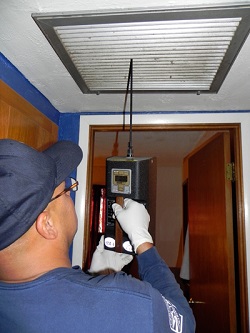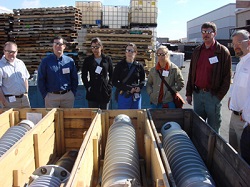

Fellows are responsible for admitting and consulting on patients at both Banner - University Medical Center Phoenix (BUMCP) and Phoenix Children's Hospital (PCH). Fellows work block schedules (days or nights), caring for all patients on the service. During their time on service, fellows also provide medical backup to the poison center. Alternating off-service periods allow time for focused didactics and clinic opportunities to see toxicology outpatients and Independent Medical Exams (IMEs).
![Banner - University Medical Center Phoenix [BUMCP]](images/image_bumcp.jpg)
BUMCP (formerly Banner Good Samaritan Medical Center) is a tertiary care academic medical center in Phoenix designated as a Level I trauma center, has a dedicated clinical toxicology lab, and is home to the Banner Poison and Drug Information Center. The facility has over 733 beds, hyperbaric chambers, and an attached inpatient behavioral health hospital. A new emergency department opened in June 2017 and a new patient tower opened in late 2018.
The Department of Medical Toxicology also operates an admitting and consulting service at PCH, a free-standing children's hospital with over 400 beds. PCH is a Level 1 pediatric trauma center and the emergency department had over 84,000 visits in recent years. A new emergency department opened in late 2017.

Each July and August, all toxicology fellows receive a series of core lectures, including basic biochemistry, physiology, pharmacology, and toxicology. Further lectures discuss the toxicity of drugs, household products, envenomations, natural toxins and occupational toxins.
Each week a faculty member meets with the fellows to discuss an assigned chapter in Goldfrank's Toxicologic Emergencies.
The chapter assignments are designed to cover the core content for medical toxicology over a 24-
Fellows also prepare summaries of chapters from Sullivan's Clinical Enviornmental Health and Toxic Exposures.
A faculty member also participates to facilitate discussion and review.
Again, chapter assignments are designed to cover the core content in industrial and environmental toxicology over a 24-month period.
Cases from the Banner Poison and Drug Information Center are reviewed weekly.
This conference focuses on common exposure calls that are routinely handled by the poison center staff in order to provide experience with calls that are not usually seen by the toxicologist.
Each Friday, fellows and rotators present short reviews on a variety of toxicology topics.
These small-group lectures provide the fellows opportunities to develop and demonstrate oral and written communication skills while the handouts provide a study resource.
A classic toxicology journal article as well as other relevant current articles are also presented.
Lastly, patients seen by the service over the previous week are reviewed.
Fellows have the opportunity to lead daily teaching rounds with rotating residents and medical students. They also teach monthly core lectures to rotators on service.
Fellows further refine their formal presentation skills by providing lectures to several area GME programs, including Maricopa emergency medicine residency, PCH pediatrics residency, and PCH pediatric emergency medicine and critical care fellowships.
Fellows have also delivered presentations at national meetings.
Each fellow is encouraged to develop and complete a research project that focuses on an area of particular interest.
Fellows are reimbursed for travel to present at the annual ACMT meeting. During their second year, travel to NACCT is also reimbursed.
A monthly departmental research conference discusses current and future research projects.

Occupational Toxicology Chapter Review
Poison Center Conference
Toxicology Conference and Journal Club
Teaching
Research
![Meghan Spyres with poster [MS with poster]](images/poster-ms.jpg)